IntuiCell, a Nordic Startup, Launches World's First Digital Nervous System for AI
A groundbreaking announcement from a Nordic deep-tech startup, IntuiCell, has set the tech world abuzz. On March 19, 2025, this spin-out from Lund University unveiled what they call the first functional "digital nervous system" that can learn autonomously, much like biological organisms. This innovation could shake up the AI landscape, potentially making many current AI methods outdated in certain applications.
What makes IntuiCell's approach so revolutionary is its departure from the static machine learning models that dominate today's AI. Instead, it mirrors the learning processes found in biological nervous systems. While traditional AI depends heavily on large datasets and backpropagation algorithms, IntuiCell's technology allows machines to learn directly from interacting with their surroundings.
In their announcement, the company proudly stated, "IntuiCell has cracked the code on how learning happens in biology and turned it into software for the first time." They describe this as a leap beyond the static models of traditional AI, toward a fully functional 'digital nervous system' that could scale to match human-level intelligence.
To showcase their technology, IntuiCell introduced "Luna," a robot dog that learns to control its body and stand up through trial and error, just like a newborn animal. Video footage released by the company captures Luna figuring out how to stand without any pre-programmed intelligence or instructions, relying entirely on the digital nervous system to learn from its experiences.
"Unlike traditional AI models, which are limited by their static training data, Luna perceives, processes, and improves through direct interaction with its world," the company explained in their press release.
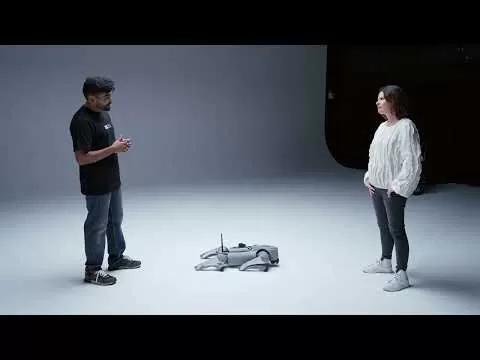
Watch this video on YouTube
How the Technology Works
At the core of IntuiCell's innovation is a shift in how machines learn. Traditional AI systems process huge datasets using static algorithms, but IntuiCell's method is inspired by biology, allowing machines to learn in a more natural, human-like way.
Viktor Luthman, CEO and Co-Founder of IntuiCell, emphasized this difference in their announcement. He pointed out that while traditional AI is great at processing data, it doesn't achieve true intelligence. In contrast, their bio-inspired system allows machines to evolve and interact with their environment in ways we've never seen before.
The architecture of this system diverges significantly from standard neural networks. IntuiCell has crafted technology that works like a biological spinal cord, forming the backbone for autonomous learning. This is part of a broader system designed to mimic the thalamocortex, the brain area responsible for sensory processing and understanding the world.
Instead of using backpropagation and massive training datasets, IntuiCell's digital nervous system uses recurrent networks with a decentralized learning algorithm that mimics brain functions. This setup enables AI agents to learn from direct experience and adapt to new situations on the fly—skills that have been hard to achieve with traditional machine learning.
The practical use of this technology is inspired by biology. Rather than programming behaviors or running data through conventional algorithms, IntuiCell plans to use dog trainers to teach their AI agents new skills. This approach marks a significant shift from typical AI development, focusing on real-world interaction over computational power. Dr. Udaya Rongala, Researcher and Co-Founder, explained that their work is rooted in three decades of neuroscience research aimed at understanding how intelligence emerges from the structure and dynamics of the nervous system.
"The focus on scaling up, using billions of parameters, more computing power, and more data is a misguided approach to achieving intelligence," Rongala remarked. "At IntuiCell, we're not chasing bigger-is-better. Intelligence is our starting point, not our end goal."
IntuiCell's vision is to create "the first real-world teachable systems; machines that learn from us, just as we would teach a new skill to an animal." They see their digital nervous system as the foundation for all non-biological intelligence, enabling others to tackle unforeseen real-world challenges without relying on massive training datasets.
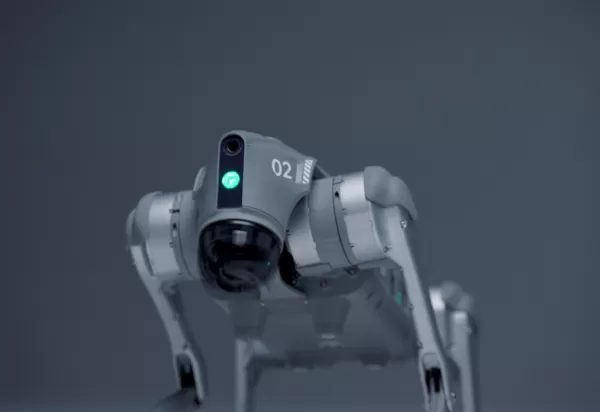 (Source: IntuiCell)
(Source: IntuiCell)
Research Foundation and Team Expertise
The groundwork for IntuiCell's technology was laid over three decades of neuroscience research at Lund University. Professor Henrik Jörntell, a co-founder of IntuiCell and a neurophysiology professor at the university, leads what the company describes as "the only lab in the world capable of recording intracellular single-neuron activity across the entire nervous system." This unique research base underpins IntuiCell's technological advancements.
The company's leadership team brings together seasoned entrepreneurs and researchers with expertise in neuroscience, AI, robotics, and business. Alongside Luthman, Jörntell, and Rongala, the founding team includes Dr. Jonas Enander, a medical doctor specializing in neuroscience; Linus Mårtensson, the lead developer who bridges research and software; and Robin Mellstrand, the COO with a background in AI-driven tech companies.
IntuiCell has raised €3.5M in funding from investors like Navigare Ventures and SNÖ Ventures. They plan to complete the full development of the digital nervous system within the next two years, with the ultimate aim of enabling any agent, whether physical or digital, to achieve "lifelong learning and adaptation to the unknown"—capabilities once thought to be exclusive to biological beings.
While the complete realization of IntuiCell's vision is still years away, their demonstration with Luna offers a promising glimpse into the potential of their technology to revolutionize AI development, creating systems that can truly learn and adapt through real-world interactions.
Related article
 Hugging Face Launches Pre-Orders for Reachy Mini Desktop Robots
Hugging Face invites developers to explore its latest robotics innovation.The AI platform announced Wednesday that it’s now accepting pre-orders for its Reachy Mini desktop robots. The company first s
Hugging Face Launches Pre-Orders for Reachy Mini Desktop Robots
Hugging Face invites developers to explore its latest robotics innovation.The AI platform announced Wednesday that it’s now accepting pre-orders for its Reachy Mini desktop robots. The company first s
 Nvidia charges ahead with humanoid robotics aided by the cloud
Nvidia is charging full speed ahead into the realm of humanoid robotics, and they're not holding back. At the Computex 2025 trade show in Taiwan, they unveiled a series of innovati
Nvidia charges ahead with humanoid robotics aided by the cloud
Nvidia is charging full speed ahead into the realm of humanoid robotics, and they're not holding back. At the Computex 2025 trade show in Taiwan, they unveiled a series of innovati
 Top 5 Autonomous Robots for Construction Sites in April 2025
The construction industry is undergoing a remarkable transformation, driven by the rise of robotics and automation. With the global market for construction robots projected to reach $3.5 billion by 2030, these innovations are revolutionizing safety and efficiency on job sites. From autonomous pile d
Comments (31)
0/200
Top 5 Autonomous Robots for Construction Sites in April 2025
The construction industry is undergoing a remarkable transformation, driven by the rise of robotics and automation. With the global market for construction robots projected to reach $3.5 billion by 2030, these innovations are revolutionizing safety and efficiency on job sites. From autonomous pile d
Comments (31)
0/200
![JoseMiller]() JoseMiller
JoseMiller
 August 27, 2025 at 3:01:30 AM EDT
August 27, 2025 at 3:01:30 AM EDT
This digital nervous system sounds like sci-fi come to life! 🤯 IntuiCell’s Luna learning to stand like a baby animal is wild. Can’t wait to see if this tech could make robots smarter than my dog at fetching!


 0
0
![JackSanchez]() JackSanchez
JackSanchez
 April 21, 2025 at 8:44:35 AM EDT
April 21, 2025 at 8:44:35 AM EDT
IntuiCell's digital nervous system sounds like sci-fi come to life! It's fascinating that it can learn autonomously. But, I'm a bit skeptical about how well it'll integrate with existing AI systems. Exciting times ahead, though! 🤖


 0
0
![WillBaker]() WillBaker
WillBaker
 April 21, 2025 at 7:27:49 AM EDT
April 21, 2025 at 7:27:49 AM EDT
IntuiCell의 디지털 신경 시스템은 SF 같아서 재미있어! 자율적으로 학습할 수 있다는 게 대단해. 하지만 기존 AI 시스템과 얼마나 잘 통합될지 의문이야. 그래도 앞으로가 기대돼! 🤖


 0
0
![JohnGarcia]() JohnGarcia
JohnGarcia
 April 20, 2025 at 8:47:46 PM EDT
April 20, 2025 at 8:47:46 PM EDT
¡El sistema nervioso digital de IntuiCell suena como ciencia ficción hecha realidad! Es fascinante que pueda aprender de manera autónoma. Pero, estoy un poco escéptico sobre cómo se integrará bien con los sistemas de IA existentes. ¡Tiempos emocionantes por delante, sin embargo! 🤖


 0
0
![DouglasMartínez]() DouglasMartínez
DouglasMartínez
 April 20, 2025 at 12:07:22 AM EDT
April 20, 2025 at 12:07:22 AM EDT
IntuiCell's digital nervous system is mind-blowing! It's like something out of a sci-fi movie. The idea of AI learning autonomously is both exciting and a bit scary. Can't wait to see how this develops! 🤖


 0
0
![AlbertThomas]() AlbertThomas
AlbertThomas
 April 17, 2025 at 6:47:24 PM EDT
April 17, 2025 at 6:47:24 PM EDT
IntuiCell의 디지털 신경 시스템 정말 놀랍네요! SF 영화에서나 나올 법해요. AI가 자율적으로 학습한다는 아이디어는 흥미롭고 조금 무섭기도 해요. 어떻게 발전할지 기대돼요! 🤖


 0
0
A groundbreaking announcement from a Nordic deep-tech startup, IntuiCell, has set the tech world abuzz. On March 19, 2025, this spin-out from Lund University unveiled what they call the first functional "digital nervous system" that can learn autonomously, much like biological organisms. This innovation could shake up the AI landscape, potentially making many current AI methods outdated in certain applications.
What makes IntuiCell's approach so revolutionary is its departure from the static machine learning models that dominate today's AI. Instead, it mirrors the learning processes found in biological nervous systems. While traditional AI depends heavily on large datasets and backpropagation algorithms, IntuiCell's technology allows machines to learn directly from interacting with their surroundings.
In their announcement, the company proudly stated, "IntuiCell has cracked the code on how learning happens in biology and turned it into software for the first time." They describe this as a leap beyond the static models of traditional AI, toward a fully functional 'digital nervous system' that could scale to match human-level intelligence.
To showcase their technology, IntuiCell introduced "Luna," a robot dog that learns to control its body and stand up through trial and error, just like a newborn animal. Video footage released by the company captures Luna figuring out how to stand without any pre-programmed intelligence or instructions, relying entirely on the digital nervous system to learn from its experiences.
"Unlike traditional AI models, which are limited by their static training data, Luna perceives, processes, and improves through direct interaction with its world," the company explained in their press release.

Watch this video on YouTube
How the Technology Works
At the core of IntuiCell's innovation is a shift in how machines learn. Traditional AI systems process huge datasets using static algorithms, but IntuiCell's method is inspired by biology, allowing machines to learn in a more natural, human-like way.
Viktor Luthman, CEO and Co-Founder of IntuiCell, emphasized this difference in their announcement. He pointed out that while traditional AI is great at processing data, it doesn't achieve true intelligence. In contrast, their bio-inspired system allows machines to evolve and interact with their environment in ways we've never seen before.
The architecture of this system diverges significantly from standard neural networks. IntuiCell has crafted technology that works like a biological spinal cord, forming the backbone for autonomous learning. This is part of a broader system designed to mimic the thalamocortex, the brain area responsible for sensory processing and understanding the world.
Instead of using backpropagation and massive training datasets, IntuiCell's digital nervous system uses recurrent networks with a decentralized learning algorithm that mimics brain functions. This setup enables AI agents to learn from direct experience and adapt to new situations on the fly—skills that have been hard to achieve with traditional machine learning.
The practical use of this technology is inspired by biology. Rather than programming behaviors or running data through conventional algorithms, IntuiCell plans to use dog trainers to teach their AI agents new skills. This approach marks a significant shift from typical AI development, focusing on real-world interaction over computational power. Dr. Udaya Rongala, Researcher and Co-Founder, explained that their work is rooted in three decades of neuroscience research aimed at understanding how intelligence emerges from the structure and dynamics of the nervous system.
"The focus on scaling up, using billions of parameters, more computing power, and more data is a misguided approach to achieving intelligence," Rongala remarked. "At IntuiCell, we're not chasing bigger-is-better. Intelligence is our starting point, not our end goal."
IntuiCell's vision is to create "the first real-world teachable systems; machines that learn from us, just as we would teach a new skill to an animal." They see their digital nervous system as the foundation for all non-biological intelligence, enabling others to tackle unforeseen real-world challenges without relying on massive training datasets.
 (Source: IntuiCell)
(Source: IntuiCell)
Research Foundation and Team Expertise
The groundwork for IntuiCell's technology was laid over three decades of neuroscience research at Lund University. Professor Henrik Jörntell, a co-founder of IntuiCell and a neurophysiology professor at the university, leads what the company describes as "the only lab in the world capable of recording intracellular single-neuron activity across the entire nervous system." This unique research base underpins IntuiCell's technological advancements.
The company's leadership team brings together seasoned entrepreneurs and researchers with expertise in neuroscience, AI, robotics, and business. Alongside Luthman, Jörntell, and Rongala, the founding team includes Dr. Jonas Enander, a medical doctor specializing in neuroscience; Linus Mårtensson, the lead developer who bridges research and software; and Robin Mellstrand, the COO with a background in AI-driven tech companies.
IntuiCell has raised €3.5M in funding from investors like Navigare Ventures and SNÖ Ventures. They plan to complete the full development of the digital nervous system within the next two years, with the ultimate aim of enabling any agent, whether physical or digital, to achieve "lifelong learning and adaptation to the unknown"—capabilities once thought to be exclusive to biological beings.
While the complete realization of IntuiCell's vision is still years away, their demonstration with Luna offers a promising glimpse into the potential of their technology to revolutionize AI development, creating systems that can truly learn and adapt through real-world interactions.
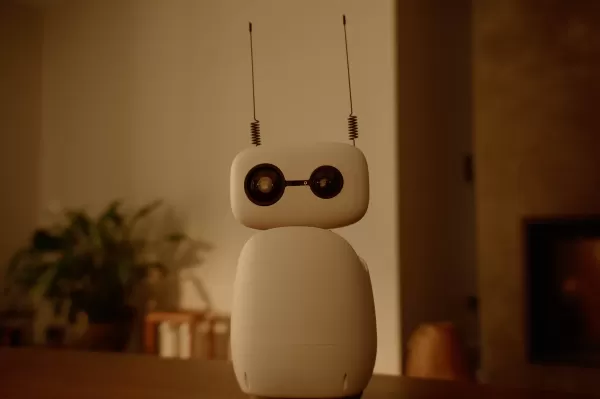 Hugging Face Launches Pre-Orders for Reachy Mini Desktop Robots
Hugging Face invites developers to explore its latest robotics innovation.The AI platform announced Wednesday that it’s now accepting pre-orders for its Reachy Mini desktop robots. The company first s
Hugging Face Launches Pre-Orders for Reachy Mini Desktop Robots
Hugging Face invites developers to explore its latest robotics innovation.The AI platform announced Wednesday that it’s now accepting pre-orders for its Reachy Mini desktop robots. The company first s
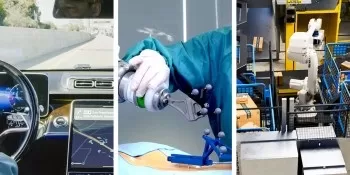 Nvidia charges ahead with humanoid robotics aided by the cloud
Nvidia is charging full speed ahead into the realm of humanoid robotics, and they're not holding back. At the Computex 2025 trade show in Taiwan, they unveiled a series of innovati
Nvidia charges ahead with humanoid robotics aided by the cloud
Nvidia is charging full speed ahead into the realm of humanoid robotics, and they're not holding back. At the Computex 2025 trade show in Taiwan, they unveiled a series of innovati
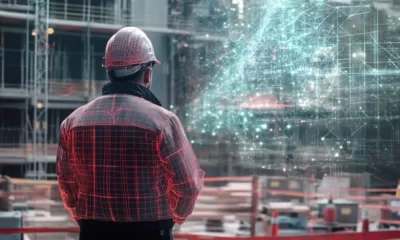 Top 5 Autonomous Robots for Construction Sites in April 2025
The construction industry is undergoing a remarkable transformation, driven by the rise of robotics and automation. With the global market for construction robots projected to reach $3.5 billion by 2030, these innovations are revolutionizing safety and efficiency on job sites. From autonomous pile d
Top 5 Autonomous Robots for Construction Sites in April 2025
The construction industry is undergoing a remarkable transformation, driven by the rise of robotics and automation. With the global market for construction robots projected to reach $3.5 billion by 2030, these innovations are revolutionizing safety and efficiency on job sites. From autonomous pile d
 August 27, 2025 at 3:01:30 AM EDT
August 27, 2025 at 3:01:30 AM EDT
This digital nervous system sounds like sci-fi come to life! 🤯 IntuiCell’s Luna learning to stand like a baby animal is wild. Can’t wait to see if this tech could make robots smarter than my dog at fetching!


 0
0
 April 21, 2025 at 8:44:35 AM EDT
April 21, 2025 at 8:44:35 AM EDT
IntuiCell's digital nervous system sounds like sci-fi come to life! It's fascinating that it can learn autonomously. But, I'm a bit skeptical about how well it'll integrate with existing AI systems. Exciting times ahead, though! 🤖


 0
0
 April 21, 2025 at 7:27:49 AM EDT
April 21, 2025 at 7:27:49 AM EDT
IntuiCell의 디지털 신경 시스템은 SF 같아서 재미있어! 자율적으로 학습할 수 있다는 게 대단해. 하지만 기존 AI 시스템과 얼마나 잘 통합될지 의문이야. 그래도 앞으로가 기대돼! 🤖


 0
0
 April 20, 2025 at 8:47:46 PM EDT
April 20, 2025 at 8:47:46 PM EDT
¡El sistema nervioso digital de IntuiCell suena como ciencia ficción hecha realidad! Es fascinante que pueda aprender de manera autónoma. Pero, estoy un poco escéptico sobre cómo se integrará bien con los sistemas de IA existentes. ¡Tiempos emocionantes por delante, sin embargo! 🤖


 0
0
 April 20, 2025 at 12:07:22 AM EDT
April 20, 2025 at 12:07:22 AM EDT
IntuiCell's digital nervous system is mind-blowing! It's like something out of a sci-fi movie. The idea of AI learning autonomously is both exciting and a bit scary. Can't wait to see how this develops! 🤖


 0
0
 April 17, 2025 at 6:47:24 PM EDT
April 17, 2025 at 6:47:24 PM EDT
IntuiCell의 디지털 신경 시스템 정말 놀랍네요! SF 영화에서나 나올 법해요. AI가 자율적으로 학습한다는 아이디어는 흥미롭고 조금 무섭기도 해요. 어떻게 발전할지 기대돼요! 🤖


 0
0





























